Quick question : who is the most tragic figure in David Lynch and Mark Frost’s Twin Peaks 2017/Twin Peaks: The Return/Twin Peaks Season Three?
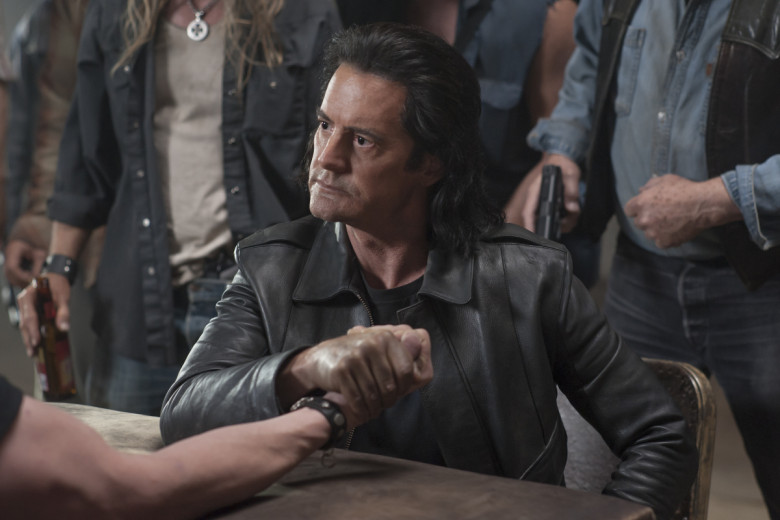
Is it Kyle MacLachlan’s Special Agent Dale Cooper, bifurcated into two distinct beings? I’m thinking no — in Part Thirteen, “Evil Coop” finally dispenses with the troublesome Ray (played — for presumably the last time — by George Griffiths) once and for all, after winning an arm-wrestling match, placing the infamous “Owl Cave Ring” on Ray’s finger, pumping him for the co-ordinates he’s been needing (along with some info on the ever-enigmatic Phillip Jeffries), and, unbeknownst to him, forging an unspoken bond with the psychotic Richard Horne (Eamon Farren), who I still maintain is his son. And while all that’s going on, back in Vegas, the brothers Mitchum (Jim Belushi and Robert Knepper) are happier than hell with Cooper’s Dougie Jones persona, coming into his insurance agency’s office in an honest-to-God conga line along with their showgirl sidekicks (once again Amy Shiels’ Candie being the only one who actually speaks) and bestowing expensive liquor, cufflinks, and even new cars on both Dougie himself as well as his boss, Bushnell Mullins (Don Murray) as ostentatious tokens of appreciation for an enormous insurance claim being decided in their favor. Heck, Sonny-Jim (Pierce Gagnon) even gets the swing set of every kid’s dreams and Janey-E (Naomi Watts) — well, shit, she’s just happier than ever, and why shouldn’t she be?
Of course, this isn’t good news for everybody — and by “everybody” I mean Tom Sizemore’s Anthony Sinclair and Patrick Fischler’s Duncan Todd. Still, Dougie’s simple-minded fascination with Sinclair’s dandruff — yes, you read that right — triggers a 180-degree transformation in the ethically conflicted con artist, and soon he’s spilling his guts and probably saving his job in one fell swoop just when he was about to commit himself to a truly irreversible decision, and with the comedically incompetent Detectives Fusco (Larry Clarke, Eric Edelstein, and David Koechner) on the case of deciphering Dougie’s true identity and predictably writing off key clues as simple “mistakes,” our empty vessel’s newfound and truly mindless suburban marital bliss seems very secure indeed. No real tragedy to be found here, then.
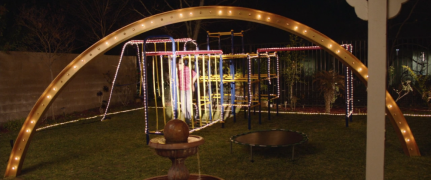
Could our tragic figure then be Sherilyn Fenn’s Audrey Horne? There’s clearly a lot more going on in the battle of wills between her and her husband (Clark Middleton) than we suspected last week — in fact, this is some MK-ULTA, Chuck Traynor/Linda Lovelace-level manipulative bullshit that’s playing out before our eyes. Audrey doesn’t even seem completely sure of where she is, what she’s doing there, where she wants to go, or how to get there from here — wherever “here” even is. So, yeah, depending on how things shake out in future installments, she might be the character trapped in the most tragic situation of all — but I really don’t think so. She’s always been a survivor, and a devious one when needs be. She’ll work her way out of this mess one way or another.
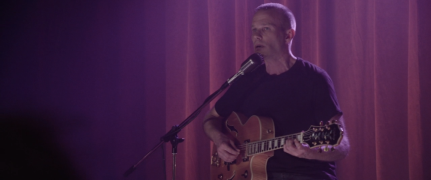
Who, then? James Hurley (James Marshall)? There was talk way back in Part Two about him being in a motorcycle accident some years ago, and he does seem a shadow of his former self, but no less an authority than Shelly Johnson/Briggs (Mädchen Amick) informed us, if you’ll recall, that “James is still cool,” and he proves it tonight by taking the stage at the Roadhouse (after being introduced by beyond-awesome emcee J.R. Starr) — the same stage recently occupied by the likes of Chromatics and “the” Nine Inch Nails — and making a transfixed female member of the audience cry with his heartfelt rendering of what’s apparently still the only song in his repertoire, “Just You And I.” Even the two creepiest-looking backup singers you’ve ever seen in your life can’t diminsh James’ musical magnetism, so nope, he’s not exactly leading a tragic existence, either.
A brief check-in with Tim Roth and Jennifer Jason Leigh shows that they’re headed through Utah, and that’s certainly tragic, no doubt, but they’ll get through to the other side of the state and make their escape at some point. And, as I predicted in my last review, Russ Tamblyn’s Dr. Amp/Jacoby and Wendy Robie’s Nadine Hurley appear to be on the verge of consummating their previously-confined-to-the-airwaves romance in the shadow of her silent drape-runners, so these two lonely souls may have just found true love at last. Let’s rule out all four of these “suspects,” then, and move on.
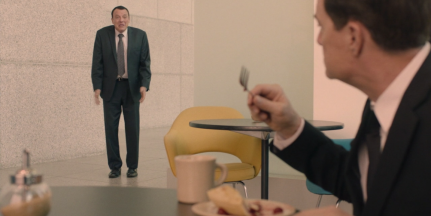
Becky Burnett (Amanda Seyfried) has it rough, there’s no denying that, given that she’s trapped in an abusive relationship with a drugged-out, two-timing loser, but at least her mom still loves her, loans her cash, and feeds her homemade cherry pie — and does she really have it any worse than her father, Deputy Bobby Briggs (Dana Ashbrook), who’s reduced to eating alone at the Double R and pining after the wife and daughter he’s lost? Hmmm — two strong contenders here, to be sure.
Except that in the end, Bobby doesn’t have to eat alone — he’s invited over to the table shared by Norma Jennings (Peggy Lipton) and (finally!!!) “Big” Ed Hurley — and I think Ed might just be our guy, because this happy trio is soon interrupted by Norma’s new beau, a cheesy financier named Walter (Grant Goodeve) who’s so blatantly phony and insincere that he makes old-school game-show hosts like Wink Martindale and Chuck Woolery seem honest and authentic by comparison. “Big” Ed still clearly carries a torch for Norma, and despite his assurances to Bobby that “nothing’s going on here,” he’s not fooling anyone. Everett McGill gives a truly gut-wrenching (and largely silent) performance here in Part Thirteen, one that anyone who’s ever been sweet on somebody they can’t have (shit, I guess that includes anyone who was ever in their twenties) can immediately relate to. He’s obviously envious of Mr. Plastic, but at the same time you can feel that he wants Norma to be happy above all else — he just knows it sure won’t be with this sleazy operator, who’s convinced her to franchise out her diner (now we know why she’s doing her books all the time), but then has the unmitigated nerve to tell her how she should be running the place. “Big” Ed obviously loves Norma to death — always has, always will — and the final scene of him eating his take-out soup alone in his gas station as the credits roll is enough to rip your beating heart right out of your chest. This is emotional desolation at its most profound — and most profoundly difficult to watch.

Yup, that’s it then, case closed — the most tragic character on the Twin Peaks revival is “Big” Ed Hurley.
But then I remember Grace Zabriskie’s Sarah Palmer, self-medicating away her pain with fifty bucks’ worth of booze and three or four packs of cigarettes every night, her daughter and husband both dead at the hands of forces beyond her understanding that now appear to be coming for her as well, watching blood-soaked nature documentaries and 1950s boxing matches on her giant television every night, basking in the cathode ray (or whatever the hell they’re made out of these days) glow in an otherwise silent home — a woman for whom the end of the world is no longer an abstraction, but something that already happened a quarter-century ago and didn’t even have the decency to take her with it. Imagine an apocalypse so heartless and cruel that it leaves you behind with no road map for how to put your life back together while everyone else goes on with theirs all around you, as if nothing even happened, and you’ll have some inkling as to what Sarah’s going through. Compared to that, shit — even “Big” Ed has it easy.
Tags: Amanda Seyfried, David Koechner, David Lynch, Derek Mears, Don Murray, Everett McGill, Jennifer Jason Leigh, Jim Belushi, Kyle MacLachlan, Madchen Amick, Mark Frost, Naomi Watts, Patrick Fischler, Peggy Lipton, Robert Knepper, Russ Tamblyn, Sherilyn Fenn, Showtime, Tim Roth, Tom Sizemore, TV, Twin Peaks

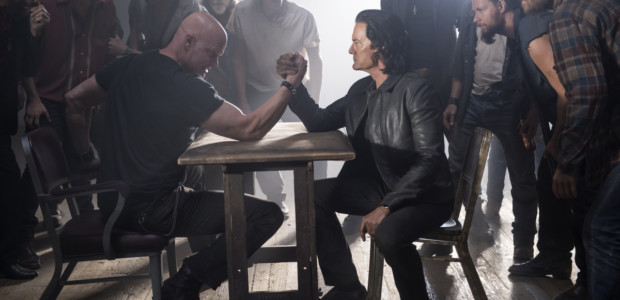
No Comments